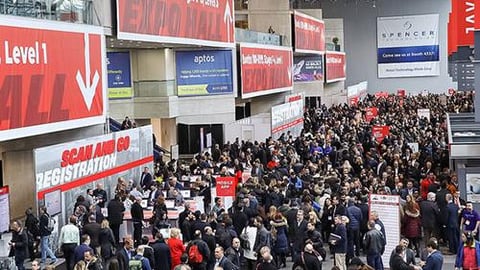NRF Day 2: 5 Trends From the Innovation Lab
Technology is center stage at the National Retail Federation's (NRF) annual Big Show taking place this week in New York City.
From mainstay companies continuously innovating to the new kids on the block, introducing their products to the market for the first time, the show offers an opportunity for innovators to be seen by thousands of retailers.
The NRF Innovation Lab is an interactive exhibit featuring more than 50 companies with cutting-edge technologies that may just represent retailers' next winning investments.
We spent some time in the lab, and five trends particularly relevant for food retailers emerged:
- Solving the out-of-stocks problem: Technology to aid in inventory management and demand forecasting has been at the forefront of the NRF Show, and the Innovation Lab was no exception. Deming Robotics has a digital robot that lives in a rail attached on one top shelf per aisle that can help with out-of-stock detection and planogram compliance in an unobtrusive manner, nearly invisible to the shopper. For Pensa, the solution is a small autonomous drone using computer vision and artificial intelligence (AI) to tackle on-shelf inventory visibility. It visually scans and recognizes the products on a shelf, knowing when items are facing the wrong direction or in the wrong spot.
- Sustainability takes many forms: The conversation has gotten stronger with retailers more invested in the environment, in many cases going beyond sustainability to regenerative principles. In the Innovation Lab, 80 Acres Farms displayed the indoor farms that it's building on a commercial scale. The closed system recycles the water used to grow the plants, using 97% less water than traditional farms and delivers pesticide-free crops, mainly greens, within hours of harvest instead of days. 80 Acres Farms is also partnering with grocers to put the farms in retail and cut this travel time to zero. For Flashfood, its mobile marketplace allows grocers to sell surplus produce at discounted prices, and although still in early stages they've partnered with 430 Loblaws markets in Canada and have pilots in Meijer and Hy-Vee stores. So far, it has diverted 5 million pounds of food from landfills.
- Improving the checkout: Reducing friction is here to stay. In the Innovation Lab, two companies showed off "smart carts." Both Caper, in the Startup Zone, and WalkOut aim to improve the customer experience with interfaces on the cart that can handle scanning of items and, more exciting, visually recognize what's going into shoppers' carts. This eliminates the need for going through a checkout, and the screens can also recommend like products or promotions during the shopping trip. Although mainly aimed at smaller convenience store-type or residential applications, Stockwell's smart vending machines remove any sort of checkout. Customers can use an app to open the store and begin the transaction, picking up and putting down items that are tracked until they close the door to end the shop. A receipt is sent to the shopper.
- Delivery or pickup faster and easier: There are many technologies aimed at solving the challenge of the last mile. Delivery Solutions, whose partners already include the likes of Wakefern Food Corp. and Giant Eagle, works with many of the large delivery partners, using its software to orchestrate which vendor gets which deliver at what time of the day so the grocer can offer same-day, and often one-hour, delivery to its customers.
- IoT from buzzword to execution: Trust and transparency are key parts of the entire supply chain, with many companies in the Innovation Lab offering IoT and blockchain ideas to follow the entire life cycle of a product. Wiliot, currently in the pilot phases, uses cloud-connected, battery-free Bluetooth tags powered by radio waves that can sense temperature and motion. IBM's Food Trust uses blockchain to provide immediate access to actionable food supply chain data, from farm to store and ultimately the consumer.
The technologies in the Innovation Lab are transforming the retail industry, but they aren't doing it alone. At NRF 2020 we're seeing company partnerships in action, and food retailers need to stay on top of what's coming next.





